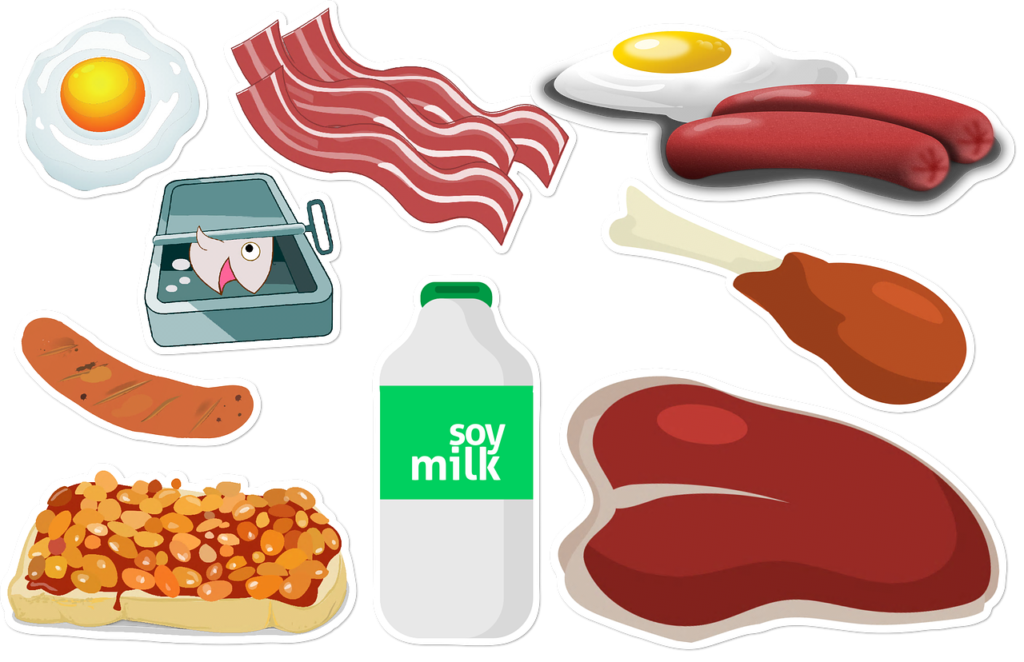Nutrition can be a complicated subject. But does it have to be? You can break nutrition down into a few groups. From there you can choose what foods you want to eat from each group in order to get the essential nutrients that your body needs.

Proteins: Building Blocks of the Body
Proteins play a pivotal role in the growth, repair, and maintenance of body tissues. Composed of amino acids, these macronutrients are essential for numerous physiological processes. Among the 20 amino acids, nine are termed “essential” because the body cannot synthesize them; hence, they must be obtained through dietary sources.
Complete Proteins & Incomplete Proteins
Proteins can be classified into two categories: complete and incomplete proteins. Complete proteins contain all nine essential amino acids in adequate proportions, making them particularly valuable for maintaining bodily functions. Common sources of complete proteins include animal-based foods such as meat, poultry, fish, eggs, and dairy products. On the other hand, incomplete proteins lack one or more essential amino acids. These are typically found in plant-based foods such as legumes, grains, nuts, and seeds. However, by combining different plant-based foods, such as rice and beans, one can create a meal that provides all essential amino acids.
Animal Based & Plant Based Proteins
Incorporating a variety of high-protein foods into your diet is crucial for balanced nutrition. Animal-based proteins, such as chicken, beef, and fish, are not only rich in essential amino acids but also provide vital nutrients like iron, zinc, and vitamin B12. Dairy products, such as milk, cheese, and yogurt, offer a dual benefit of protein and calcium. Plant-based proteins, including lentils, chickpeas, almonds, and quinoa, are excellent alternatives for those following vegetarian or vegan diets, offering fiber and other beneficial compounds.
Recommended Daily Intake
The recommended daily intake of protein varies based on factors such as age, sex, and activity level. Generally, the average adult should aim for 0.8 grams of protein per kilogram of body weight. For instance, a person weighing 70 kilograms (about 154 pounds) would require approximately 56 grams of protein per day. Athletes or individuals with higher physical activity levels may need more to support muscle repair and growth.
Consuming a diverse range of protein sources ensures that you receive all essential amino acids and other nutrients, contributing to overall health and well-being.

Fats: Essential for Brain Health and Energy Storage
Fats are indispensable for the human body, playing several critical roles, such as supporting cell growth, protecting organs, and maintaining body temperature. Additionally, fats aid in the absorption of fat-soluble vitamins like A, D, E, and K, and serve as a significant energy source.
Saturated Fats
Fats are categorized into three main types: saturated, unsaturated, and trans fats. Saturated fats, typically found in animal products like meat and dairy, have been linked to increased levels of LDL cholesterol, potentially leading to cardiovascular diseases. However, they are necessary in moderation as they contribute to hormone production and other bodily functions.
Unsaturated Fats
Unsaturated fats, which include monounsaturated and polyunsaturated fats, are considered beneficial for heart health. Monounsaturated fats, found in foods like avocados, nuts, and olive oil, help reduce bad cholesterol levels in the blood. Polyunsaturated fats, including omega-3 and omega-6 fatty acids, are essential fats that the body cannot produce on its own. Fatty fish, flaxseeds, and walnuts are excellent sources of polyunsaturated fats. These fats play a vital role in brain function and cell growth.
Trans Fats
Trans fats, often found in processed and fried foods, are the least healthy type of fats. They can raise LDL cholesterol and lower HDL cholesterol, contributing significantly to heart disease. Therefore, it is crucial to limit the intake of trans fats to maintain overall health.
Incorporating healthy fat sources into your diet is essential. Foods such as avocados, nuts, seeds, and fatty fish provide the necessary fats for brain health and energy storage. However, it is equally important to moderate fat intake to avoid the risk of cardiovascular diseases. Balancing the types of fats consumed can promote optimal health and well-being.

Carbohydrates: The Primary Energy Source
Carbohydrates serve as the primary energy source for the body, fueling both physical activity and essential organ functions. You have two main types: simple carbohydrates and complex carbohydrates. Simple carbs, found in foods like fruits, milk, and sugar, are composed of one or two sugar molecules, making them easy and quick for the body to digest and use for immediate energy. On the other hand, complex carbohydrates, found in whole grains, legumes, and starchy vegetables, consist of longer chains of sugar molecules, which take more time to break down and provide a more sustained energy release.
Consuming a balanced amount of healthy carbohydrates is crucial for maintaining energy levels and overall health. Whole grains such as brown rice, quinoa, and oats are excellent sources of complex carbs. These foods not only provide lasting energy but are also rich in dietary fiber, which aids in digestion and helps maintain blood sugar levels. Fruits and vegetables, especially those with a high fiber content, offer a mix of simple and complex carbohydrates, along with vital vitamins, minerals, and antioxidants that support various bodily functions.
While carbohydrates are essential, it is important to be mindful of the types and amounts consumed. Refined carbohydrates and sugars, commonly found in processed foods, sugary snacks, and soft drinks, can lead to rapid spikes and crashes in blood sugar levels. Overconsumption of these refined carbs has been linked to various health issues, including obesity, type 2 diabetes, and cardiovascular diseases. Therefore, prioritizing whole food sources of carbohydrates and limiting the intake of refined carbs can contribute significantly to a healthier diet and lifestyle.
Vitamins and Minerals: Micronutrients for Overall Health
Vitamins and minerals are indispensable micronutrients that play crucial roles in maintaining overall health and well-being. These substances are required in small quantities but are vital for numerous physiological functions, including immune support, bone health, and metabolic processes.
Vitamin A
Vitamin A is essential for vision, immune function, and skin health. Deficiency in Vitamin A can lead to night blindness and increase susceptibility to infections. Rich dietary sources include carrots, sweet potatoes, and spinach.
Vitamin C
Vitamin C acts as a powerful antioxidant and is crucial for collagen synthesis, wound healing, and immune defense. A deficiency in Vitamin C can result in scurvy, characterized by bleeding gums and fatigue. Citrus fruits, strawberries, and bell peppers are excellent sources.
Vitamin D
Vitamin D is vital for calcium absorption and bone health. Inadequate Vitamin D levels can lead to rickets in children and osteomalacia in adults. Sun exposure, fortified dairy products, and fatty fish like salmon are good sources of Vitamin D.
Vitamin E
Vitamin E functions as an antioxidant, protecting cell membranes from oxidative damage. Deficiency can cause neurological problems and muscle weakness. Nuts, seeds, and green leafy vegetables are rich in Vitamin E.
Vitamin K
Vitamin K is essential for blood clotting and bone metabolism. A lack of Vitamin K can lead to bleeding disorders and weakened bones. Green leafy vegetables, such as kale and spinach, are abundant sources.
Calcium
Among minerals, calcium is crucial for bone and teeth health, muscle function, and nerve signaling. Deficiency can cause osteoporosis and muscle spasms. Dairy products, tofu, and broccoli are rich in calcium.
Potassium
Potassium is vital for maintaining fluid balance, nerve function, and muscle contractions. Low potassium levels can result in muscle weakness and cramps. Bananas, oranges, and potatoes are excellent sources.
Iron
Iron is necessary for hemoglobin formation and oxygen transport in the blood. Iron deficiency can lead to anemia, characterized by fatigue and weakened immunity. Red meat, beans, and lentils are rich in iron.
The integration of these vitamins and minerals into your diet is essential for optimal health. A balanced diet, rich in a variety of fruits, vegetables, lean proteins, and whole grains, can help ensure adequate intake of these micronutrients. By prioritizing nutrient-dense foods, you can support your body’s diverse needs and promote long-term well-being.



